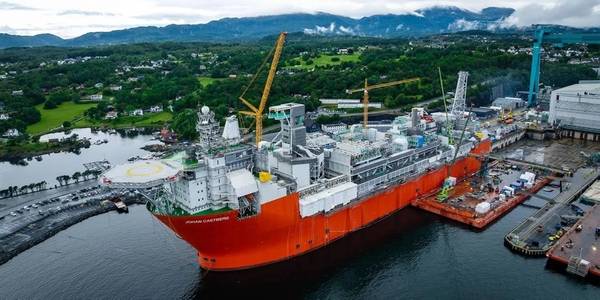
Costs at Equinor-operated Johan Castberg offshore field development project have increased by almost NOK 13 billion (currently $1,2 billion) since last year, but the production start-up date remains unchanged and is still slated for the fourth quarter of 2024.
The Johan Castberg field is located about 100 kilometers north of the Snøhvit field in the Barents Sea. The field is being developed with an FPSO vessel and extensive subsea development.
Commenting on the soaring costs, Geir Tungesvik, Equinor’s executive vice president for Projects, Drilling & Procurement, said: “Costs are increasing due to a larger than expected scope of work and cost increases in the industry, we take this seriously. However, Johan Castberg is still a good project with a solid economy. With a breakeven of around USD 35 per barrel, Johan Castberg will provide substantial revenue and ripple effects to the community from the Barents Sea for 30 years."
According to Equinor, the main reason for the rise in the investment estimate from last year is that the workload transferred to Stord has been more comprehensive and complex than estimated. In addition, Equinor said the project has not progressed as planned. Due to the market cost development the marine operations, drilling and completion costs have also increased, the company said.
When the plan for development and operation (PDO) was submitted in 2017, the cost estimate was NOK 57 billion (2023), which is currently around $5,28B. The updated project cost estimate is now NOK 80 billion (currently around $7,4 billion). Project costs have risen by NOK 15.5 billion, in addition to a currency effect of just above NOK 7 billion.
Infection control measures and reduced access to labor in connection with the COVID-19 pandemic affected the project, both in Singapore, where the hull and living quarters for the production vessel were constructed, and at Norwegian yards constructing modules for the production facility.
Proven volumes in Johan Castberg are estimated at between 450 and 650 million barrels of oil. The vessel is designed for a daily production of close to 190 000 barrels.
"Every day, around 2000 people work on completing the FPSO at Stord. In the operations phase Johan Castberg will provide jobs, ripple effects, and revenue to the community for 30 years. Johan Castberg is estimated to require 1700 person-years of work during the operations phase, of which 500 will be in Northern Norway," Equinor said.
Equinor is the operator of the Johan Castberg license with a 50% stake. Vår Energi ASA (30%) and Petoro AS (20%) are partners.